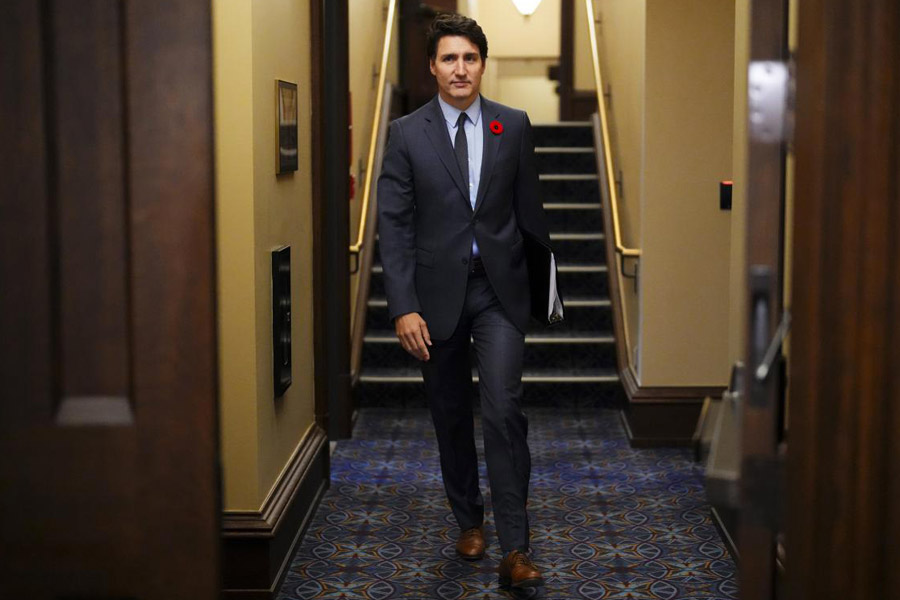Canadian Prime Minister Justin Trudeau has admitted that his government made "mistakes" in its immigration policy which led to "bad actors" like "fake colleges" and big corporations exploiting the system for their vested interests.
Trudeau's statement on Sunday came amidst his Liberal Party's denting popularity ahead of the 2025 general election in Canada. The prime minister is facing intense public criticism due to his policies leading to housing shortage, inflation, and deteriorating health and transport systems in the country. The opposition Conservative Party has also been accusing his government of mismanagement and failure to prioritise Canadian citizens' needs.
In a video message posted on his YouTube channel, Trudeau said, "In the last two years, our population has grown really fast, like a baby boom...Increasingly bad actors like fake colleges and big chain corporations have been exploiting our immigration system for their own interests." To combat this, "we are reducing the number of immigrants who are coming to Canada for the next three years," he said.
"We made some mistakes and that's why we are taking this big turn," he said, justifying his government's action.
Outlining the government's latest immigration strategy, Immigration Minister Marc Miller said last month that Canada will admit approximately 3,95,000 permanent residents in 2025, marking a drop of nearly 20 per cent from the 4,85,000 expected this year.
The plan also sets a target for temporary immigrants, including international students and foreign workers. Their numbers are expected to drop to about 4,46,000 in 2025 and 2026, down from roughly 8,00,000 this year.
By 2027, Canada will accept just 17,400 new non-permanent residents, the new policy suggested.
Canada also ended the popular fast track study visa programme, SDS, a major policy decision that is likely to impact scores of international students, including from India. According to the Indian High Commission here, India is the largest source country of foreign students with an estimated 4,27,000 Indian students studying in Canada.
Trudeau said for years, Canada's immigration system only focussed on Permanent Immigration where people come with family to settle in Canada and the government decides the number of permanent residents that it wants to admit each year. However, in doing so, it missed "the other pathway -- the temporary immigration", which involves international students, temporary workers and so on.
"After the (coronavirus) pandemic, our economy came roaring back quickly. We wanted more workers fast. We were in the midst of a huge labour shortage. Temporary foreign workers became such a significant part of our workforce...So, we brought in more workers," he said.
And it was the right choice and it worked, Trudeau emphasised.
"Our economy grew. Restaurants and stores reopened, businesses kept running, but most importantly, in spite of lots of economists’ predictions, we avoided the worst-case scenario -- a recession,” he said.
However, the prime minister said, some saw that as an opportunity to profit, to game the system.
"We have seen way too many large corporations doing this. Far too many colleges and universities used international students to raise their bottom line, because they could charge these students tens of thousands of dollars more for the same degree.
"And then there are really bad actors who outright exploit people who target vulnerable immigrants with promises of jobs, diplomas and easy pathways to citizenship promises that would never come true,” he said.
"Looking back when the post pandemic boom cooled and the businesses no longer needed the additional workforce, as a federal team, we could have acted quicker and turned off the taps faster," Trudeau admitted.
Canada's new immigration plan is "straightforward -- lower the number of immigrants -- both permanent and temporary," he said, adding that the government is prioritising permanent residents with the skills it needs like healthcare and construction workers.
Trudeau said the cut on the cap on immigrants coming to Canada was necessary to address its housing crisis and cost-of-living issues.
“The goal is to help stabilise population growth while housing stocks catch up, and then to consider gradually increasing immigration rates once again,” he said, adding that this pause is going to "give our economy and our communities the chance to catch up with things like our plan to build more homes".
"Some temporary residents may turn to our asylum system when their visa expires...Those claims will be analysed and processed, and if their claim fails, they’ll be sent home,” Trudeau said.
India-Canada ties remain deeply troubled over the North American country’s alleged support to Khalistani separatists and its accusation of India’s involvement in the killing of Hardeep Singh Nijjar, a Canadian citizen who has been designated a terrorist by India.
India rejected Trudeau’s charges as “absurd” and expelled six Canadian diplomats. India also withdrew its High Commissioner in Canada Sanjay Kumar Verma after dismissing Ottawa's allegations. India has been maintaining that the main issue between the two countries is that of Canada giving space to pro-Khalistan elements operating from Canadian soil with impunity.
Except for the headline, this story has not been edited by The Telegraph Online staff and has been published from a syndicated feed.











